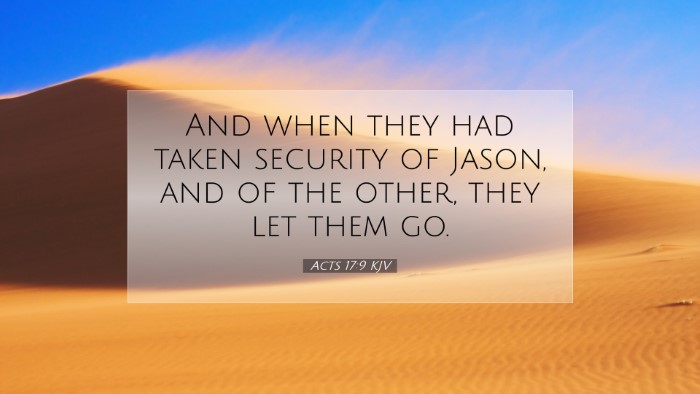Commentary on Acts 17:9
Bible Verse: Acts 17:9 - "And when they had taken security of Jason and of the other, they let them go."
Introduction
The verse in Acts 17:9 alludes to a significant episode in the Apostle Paul's second missionary journey. The context of this event is vital for understanding the early church's challenges and the nature of their opposition. This commentary synthesizes insights from several public domain sources, including Matthew Henry, Albert Barnes, and Adam Clarke, to provide a comprehensive exploration of this passage.
Contextual Overview
This verse follows an episode where Paul and his companions were accused of disturbing the peace of Thessalonica, where they had been preaching the message of Christ. The immediate context reveals the tension between the burgeoning Christian community and the established cultural norms.
- Background to the Incident: The missionary efforts of Paul had provoked a riot in the city. The Jewish leaders, jealous of Paul's growing influence, incited the populace against them.
- Jason’s Role: Jason, a believer who offered hospitality to Paul and his companions, became a target for the authorities in their attempts to quash the movement.
Commentary Insights
1. The Nature of 'Security'
Matthew Henry elaborates that the term 'security' here implies a sort of bond or assurance that Jason would ensure the peace—an interesting reflection on the legal and social conditions faced by early Christians.
Henry notes that this situation indicates how deeply the local authorities were threatened by the Christian faith, leading them to require a guarantor. This reflects the precarious situation for believers during this era.
2. The Response of the Authorities
Albert Barnes highlights that the magistrates were more concerned with public order than truth or justice. In acting to ensure Paul and his associates would not return to Thessalonica without some form of security, they inadvertently acknowledge the influence of the Christian message.
This perspective invites reflection on how the church should relate to societal authorities—striving for integrity and yet facing persecution for their beliefs.
3. The Implications for Local Believers
Adam Clarke comments on the broader implications for Jason and the other believers in Thessalonica. He argues that their identification with Paul and the ensuing violence posed a spiritual challenge, requiring them to remain steadfast in faith amidst worldly pressures.
This incident serves as an exhortation to modern Christians about the cost of discipleship and loyalty to the gospel, even when societal pressures mount.
4. Reflection on Christian Conduct
Insight from Barnes points out that while Jason was released, the act of taking security suggests that Christians must navigate a balance between faithfulness and societal expectations. This narrative thus serves as a call to believers to conduct themselves wisely in hostile environments.
Such reflections encourage pastors and theologians to consider contemporary implications of biblical fidelity in the face of opposition, further drawing parallels to prevailing socio-political climates.
Theological Reflection
The events in Acts 17:9 symbolize a broader theme of the early church's challenges. The tension between the kingdom of God and earthly authorities remains relevant in contemporary theological discourse. The interplay of faith and governance invites deep theological exploration and provides rich material for pastoral application.
5. The Cost of Discipleship
Henry’s remarks serve as a reminder that following Christ may come with trials and sacrifices. Jason’s willingness to stand in for Paul reflects a compelling example of courage and commitment that should inspire believers today.
6. The Role of Local Churches
Local churches today can draw from Jason’s example, embracing a supportive role for missionaries and evangelists while also preparing their congregations for potential conflicts that may arise from their faith.
Conclusion
Acts 17:9 encapsulates a pivotal moment in the early church’s mission, shedding light on the nature of early Christian witness. Understanding this passage through the insights of respected commentaries deepens one’s appreciation for the complexities of faith in the historical context as well as its implications for contemporary Christian living.
The blend of historical analysis and theological reflection equips pastors, students, theologians, and scholars to engage deeply with the text, drawing applications that resonate with their contexts today.


